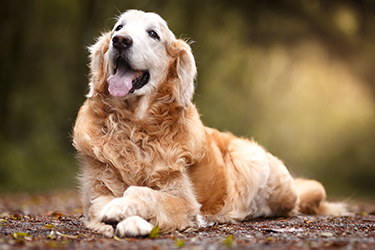Changes in a Senior Dog’s Behavior: Is it Age or Health Related?

With the average dog now living longer, clients need to be aware of the behavioral signs to watch for that could indicate age-related changes that require veterinary attention.
Changes to Watch for as a Dog Ages
Behavioral Changes
Improved veterinary care and dietary habits have not only bettered the health of our dogs, but have also lengthened their lives. As a result, veterinarians and owners are finding that older animals are facing age-related conditions that require different approaches for their care.
For example, age-related problems are often observed in older dogs experiencing behavioral changes in:- Drinking patterns
- Voiding habits
- Bowel functions
Thirst and Urination
Clients need to know that the following behavioral changes can be associated to age, but may also be related to health issues requiring a veterinarian’s care.
- Increased thirst
- Drinking large amounts of water
- Frequent need to urinate
- Incontinence
When an older dog needs to urinate more frequently it may be a sign that their kidneys are losing the ability to concentrate wastes. Aging is not always the cause of kidney failure, but because kidney disease is slow to progress, the symptoms often appear later in an animal’s life.
When talking with clients:
- Reinforce the pet’s need for a thorough examination by explaining that these same symptoms occur with urinary tract disease, diabetes and Cushing’s syndrome, conditions that must receive veterinary treatment
- Remind that even though it may be tempting to reduce or to remove the animal’s water, this is not the way to control incontinence or to reduce the animal’s need to go out during the day or night
Soiling
When an older dog soils in the house, the abnormal behavior may be due to age-related movement difficulties that could be resolved by environment modification. However, often this behavior is caused by health conditions requiring veterinary intervention. House soiling in senior animals is often connected to:
- Musculoskeletal conditions that restrict activity
- Dogs that develop difficulties with movement may become unable or unwilling to move to the area where they know they are to eliminate
- Remind clients:
- Slick floor surfaces and steps make movement difficult for senior animals
- Adding rugs that offer traction and providing ramps so animal doesn’t have to maneuver steps may help reduce animal’s movement difficulties
- Veterinary prescribed treatments to help decrease pain, increase joint mobility and slow the progression of the condition are available, including:
- Nonsteroidal anti-inflammatory drugs (NSAIDS)
- Glucosamine and chondroitin sulfate
- Omega fatty acids
- Diets with special supplements
- Hormone-responsive incontinence
- Mostly seen in middle-aged or older spayed females, and less commonly in older neutered males
- Observed in dogs that:
- Urinate normally, but wet when relaxed or asleep
- Sometimes dribble urine when walking
- Caused by deficiencies of estrogen in females and testosterone in males
- Require veterinarian examination
- Prescription medications may be available to help control this condition
- Failing memory or cognitive dysfunction
- Veterinarian may be able to prescribe a treatment to help restore the learned behavior
Clients need to be reminded that when these problems crop up, the animal is not misbehaving, but is most likely unable to control the problem. Punishing the animal may cause them to be fearful and make the problem worse.
Constipation
Older dogs often experience problems with hard, dry stools that make voiding difficult. Sometimes the cause is related to age-related movement difficulties which results in the animal drinking less water, but there are other factors that can contribute, such as:
- Lack of exercise
- Lack of a diet that meets their body’s needs
- Reduced bowel activity
- Abdominal wall and muscle weakness
- Prostate problems
Ways that clients can help their pet include:
- Mixing equal parts of kibble and water and allowing it to soak
- Adding fiber to the diet
- Always providing clean, fresh water
- Monitoring their pet’s daily water consumption
- Bringing the water bowl to the pet several times a day, if needed
- Providing kibble that fits a senior’s needs, such as a high-fiber food
Veterinarian care can offer:
- Diet and nutrition advice especially made for the needs of a senior animal, for example:
- Easy digestion
- Caloric levels to match animal’s lifestyle
- Nutritional or supplement needs, for example:
- Added fiber
- Joint supplements
- Anti-aging nutrients
Clients with senior animals need to know that as their pet grows older they may experience changes in their behavior of which the animal has no control. When these changes are observed it is important to bring the animal in to see the veterinarian.
Contact your Covetrus representative for additional tips on providing services to senior pets. Call us at 855.1.724-3461.
Sources:http://www.aspca.org/pet-care/dog-care/common-dog-behavior-issues/behavior-problems-older-dogs
https://www.avma.org/public/PetCare/Pages/Caring-for-an-Older-Pet-FAQs.aspxCareers
Are you looking for a place to let your talents shine? At Covetrus, we help our practitioner customers better serve their patients and take pride in providing the best customer experience possible. Search our open positions to see our available opportunities.
Newsletter
Stay current with what’s going on with Covetrus, subscribe to receive our newsletter and email communications. Subscribers will receive the latest information in practice management, sales and marketing, animal health, and more.


Leave a comment